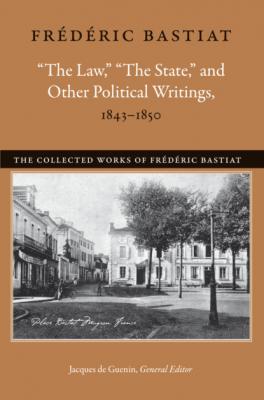“The Law,” “The State,” and Other Political Writings, 1843–1850. Bastiat Frédéric
Читать онлайн.| Название | “The Law,” “The State,” and Other Political Writings, 1843–1850 |
|---|---|
| Автор произведения | Bastiat Frédéric |
| Жанр | Экономика |
| Серия | The Collected Works of Frederic Bastiat |
| Издательство | Экономика |
| Год выпуска | 0 |
| isbn | 9781614872542 |
Fellow citizens, since time immemorial two political systems have confronted
[print edition page 104]
one another and both have good arguments to support them. According to one, the state has to do a great deal, but it also has to take a great deal. According to the other, its twin action should be little felt. A choice has to be made between these two systems. But as for the third system, which takes from the two others and which consists in demanding everything from the state while giving it nothing, this is illusionary, absurd, puerile, contradictory, and dangerous. Those who advocate it to give themselves the pleasure of accusing all forms of government of impotence, and of thus exposing them to your blows, those people are flattering and deceiving you, or at the very least they are deceiving themselves.
As for us, we consider that the state is not, nor should it be, anything other than a common force, instituted not to be an instrument of mutual oppression and plunder between all of its citizens, but on the contrary to guarantee to each person his own property and ensure the reign of justice and security.11
[print edition page 105]
[vol. 7, p. 238. “L’État.” Originally published as a draft dated 11–15 June 1848, in the first issue of Jacques Bonhomme.1
“There are those who say, ‘A financial man, such as Thiers, Fould, Goudchaux, or Girardin, will get us out of this.’ I think they are mistaken.”
“Who, then, will get us out of this?”
“The people.”
“When?”
“When the people have learned this lesson: since the state has nothing it has not taken from the people, it cannot distribute largesse to the people.”
“The people know this, since they never cease to demand reductions in taxes.”
“That is true, but at the same time they never cease to demand handouts of every kind from the state.
They want the state to establish nursery schools, infant schools, and free schools for our youth, national workshops for those that are older, and retirement pensions for the elderly.
They want the state to go to war in Italy and Poland.
They want the state to found farming colonies.
They want the state to build railways.
They want the state to bring Algeria into cultivation.
They want the state to lend ten billion to landowners.
[print edition page 106]
They want the state to supply capital to workers.
They want the state to replant the forests on mountains.
They want the state to build embankments along the rivers.
They want the state to make payments without receiving any.
They want the state to lay down the law in Europe.
They want the state to support agriculture.
They want the state to give subsidies to industry.
They want the state to protect trade.
They want the state to have a formidable army.
They want the state to have an impressive navy.
They want the state to . . .”
“Have you finished?”
“I could go on for another hour at least.”
“But what is the point you are trying to make?”
“This. As long as the people want all of this, they will have to pay for it. There is no financial man alive who can do something with nothing.”
Jacques Bonhomme is sponsoring a prize of fifty thousand francs to be given to anyone who provides a good definition of the word state, for that person will be the savior of finance, industry, trade, and work.
Конец ознакомительного фрагмента.
Текст предоставлен ООО «ЛитРес».
Прочитайте эту книгу целиком, купив полную легальную версию на ЛитРес.
Безопасно оплатить книгу можно банковской картой Visa, MasterCard, Maestro, со счета мобильного телефона, с платежного терминала, в салоне МТС или Связной, через PayPal, WebMoney, Яндекс.Деньги, QIWI Кошелек, бонусными картами или другим удобным Вам способом.
